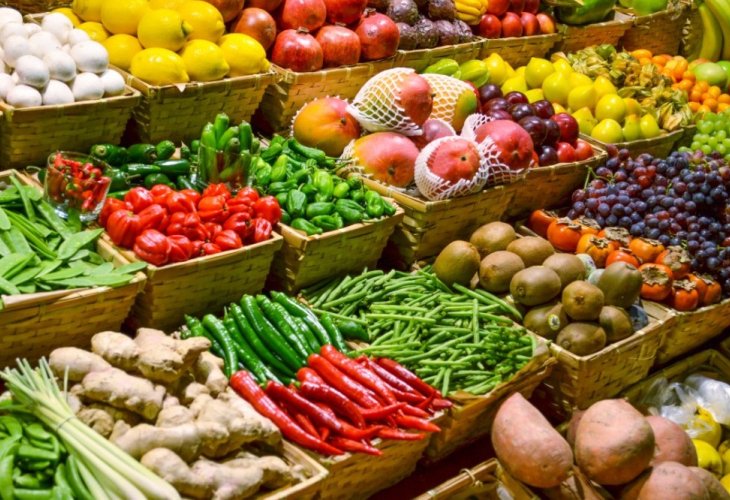Personality Development
How to Get the Most from Fruits and Vegetables – And Avoid Hidden Food Hazards
A Guide to Freshness, Clean Eating, Seasonal Nutrition, and Harmful Additives to Watch Out For
 (Photo: shutterstock)
(Photo: shutterstock)Many people are careful to consume fruits and vegetables, but they often fail to gain the full health benefits due to a lack of attention to the following factors:
1. Freshness:
Fruits and vegetables that are not fresh gradually lose a significant portion of their vitamins and nutrients over time. When they become old and wilted, the loss is even greater. Even fruits and vegetables that can be eaten raw lose part of their vitamin content during cooking, especially when overcooked.
2. Cleanliness:
It's important to thoroughly clean fruits and vegetables from pesticides, either by washing them well with soapy water or peeling them. For varieties that can be checked easily for insects, organic produce is preferable since it is grown with little to no pesticide use, or with non-toxic alternatives. While organic products are currently more expensive, increased public demand will likely reduce their prices over time.
3. Color Variety:
When choosing fruits and vegetables, aim for a colorful variety. Each color indicates different types of vitamins and minerals, and consuming a range of colors helps ensure your body receives all essential nutrients. Cooking with colorful vegetables not only improves health benefits but also enriches flavor- reducing the need for harmful additives like soup powders (which often contain unhealthy substances).
4. Eating Seasonal Produce:
Despite the modern availability of produce year-round, it's important to prioritize fruits and vegetables that are naturally in season. Nature was created in perfect harmony, and in each season the body requires specific nutrients- usually found in the fruits and vegetables that ripen during that time. For example, during the cold winter months, the body is more susceptible to illness and needs higher doses of Vitamin C, which is abundant in citrus fruits- the season’s natural produce. In contrast, summer fruits such as grapes, watermelon, and melons help hydrate and cool the body.
As the Rambam (Maimonides) writes: “In the summer, eat cooling foods and use fewer spices. In winter, eat warming foods, increase spice intake, and consume small amounts of mustard and asafetida...Adjust your diet to your location and climate.”
Avoiding Harmful Foods and Additives
We’ve addressed healthy dietary components. However, in today’s modern age, it's equally critical to avoid harmful and toxic substances that are knowingly added to many commercially sold food products for profit. Below are key examples:
Artificial Food Coloring:
The term “food coloring” can be misleading- it implies these colors are derived from natural sources, like the red of watermelon or orange of citrus. In reality however, most are made from coal tar or metal powders. Despite concerns about potential links to cancer, some food dyes that are banned in the U.S. and Europe are still allowed in Israel. For example, Beta-Apo-8 and E123 are banned abroad but remain in use locally. Regardless, artificial food coloring harms the body to varying degrees and should be avoided whenever possible.
Preservatives:
Although “preserving” sounds beneficial, food preservatives are often chemical agents that kill bacteria. While this prevents spoilage and extends shelf life for the manufacturer’s benefit, these chemicals remain in the food and harm the human gut’s healthy bacteria which is critical for proper digestion.
Hydrogenated Fats:
The human body is adapted to digest natural fats. Hydrogenated fats like margarine are industrially altered oils that the body struggles to process, often causing cellular damage. It’s worth noting that while meat and fat from previous generations came from pasture-fed animals and were relatively healthy, today’s livestock are often fed low-quality diets containing pesticides and antibiotics and are injected with hormones. This drastically lowers the health quality of the meat. One should therefore minimize consumption of beef and lamb and especially avoid their fat- especially when it comes to processed meat.
A Balanced and Mindful Approach
While the information above paints a sobering picture of modern dietary habits, the goal is to encourage meaningful change, not fear. The Torah commands us to care for our health, but it also teaches moderation and kindness. It's important not to become overly anxious or force our lifestyle changes onto others in stressful or controlling ways. The human body has resilience and can cope with a certain degree of harmful exposure, so let education and joy be our guiding light. As it says in the Torah: “Her ways are ways of pleasantness, and all her paths are peace” (Proverbs 3:17).
Even though changing habits is difficult, especially when accustomed to modern industrial foods, our bodies are part of nature. We are obligated to return to what is natural and stop harming ourselves. Every person has free will- fortunate is the one who chooses a healthy life, both physically and spiritually.
Let us conclude with the powerful words of the Rambam: “When one eats or drinks...one should not do so solely for pleasure, like dogs or donkeys, but to maintain the health of the body and its organs. Therefore, one should eat only foods that benefit the body- whether bitter or sweet- and avoid foods harmful to the body, even if they are pleasing to the palate.”

